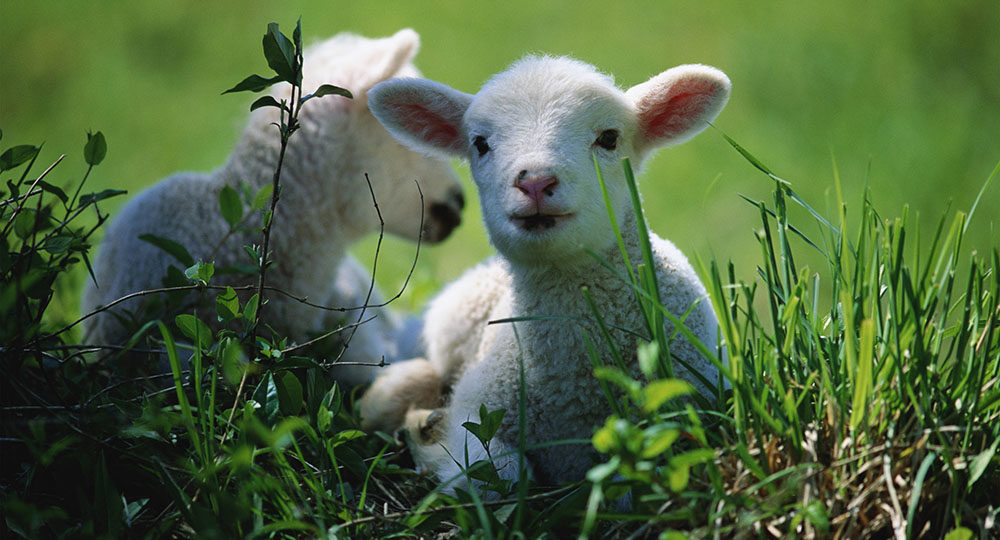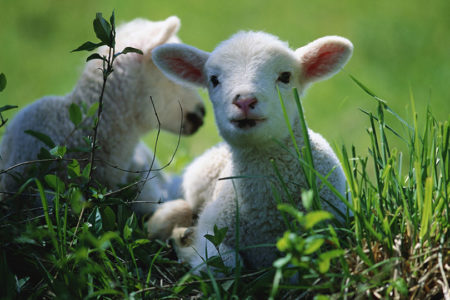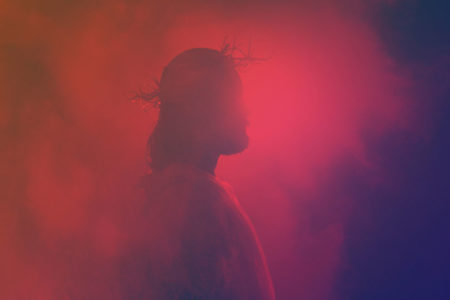Jehovah-Jireh: The Lord Will Provide a Lamb
The hands of Caiaphas are bloodstained. On this high holiday, this Day of Atonement, he has already cut the throat of the sacrificial bull. Now he is ready to do the same to the small goat quietly standing before him.
Once a year—and only once—Caiaphas, as high priest, is required to perform these sacrifices. Once a year he—and only he—is permitted to enter the most sacred place of the entire Temple, the Holy of Holies, and then only if he brings with him the sacrificial blood.
The bull had been slain to atone for the sins of the High Priest and those of his family. The goat will be slain to cleanse the elements of the Temple itself.
Off to the side, a second goat is waiting. Earlier, both goats had been brought to Caiaphas. At that point, he had shaken a small box containing two lots. On one lot were written the words, For the Lord, and on the other lot, For Azazel (scapegoat). Caiaphas then put both hands in the box and took a lot in each hand. The hand that had the lot For the Lord signified which goat was to be sacrificed. The other signified which was to be the scapegoat. To distinguish between the two, Caiaphas tied a red woolen thread or rope to the head of the scapegoat and one on the neck of the sacrificial goat. The time has now come for this last goat to give up its life.
Caiaphas looks down at the animal, its red ribbon swaying gently in the breeze. As the knife is skillfully drawn across its neck, the sacrifice makes no sound. A Scripture passage suddenly jumps to life in Caiaphas’ memory. From the Prophet Isaiah he remembers, “he is brought as a lamb to the slaughter, and as a sheep before her shearers is dumb, so he openeth not his mouth” (Isa. 53:7).
As the blood is caught in a basin, the animal coughs and wheezes, its life source being drained. Caiaphas watches, absorbed by the animal’s death struggle. He has seen it many times before, but it never ceases to fascinate him. There, before his eyes, is the awful consequence of sin. Had not the Prophet Ezekiel proclaimed, “The soul that sinneth, it shall die” (Ezek. 18:20)? And here it is, all laid out in graphic imagery. It is not that the animal has done anything wrong. That is the irony of it all. The animal is totally innocent. Yet it dies.
As he carries the basin of blood toward the entrance of the Holy Place, Caiaphas ponders this sacrificial system God has set up through the Mosaic Law. He recalls that there are sacrifices for personal sins and national sins; sacrifices for unintentional sins and deliberate sins; sacrifices for any day and holidays.
But whatever the sacrifice, whenever atonement for sin needs to be made, a central theme runs throughout. A substitute must be provided, whether it be an animal or, as in some cases, grain, incense, or even money, before atonement can be accomplished. And in most cases, the sacrifice is characterized by the shedding of blood, the taking of a life in exchange for the life of the offender. God’s reason for ordaining it to be this way is explained in the Book of Leviticus: “For the life of the flesh is in the blood; and I have given it to you upon the altar to make an atonement for your souls; for it is the blood that maketh an atonement for the soul” (Lev. 17:11).
Immersed in his reflection, Caiaphas remembers this principle being implemented since the beginning of time. When Adam and Eve sinned, “the Lᴏʀᴅ God [made] coats of skins, and clothed them” (Gen. 3:21). An animal had given up its life to provide its skin as a covering, a picture of substitutionary atonement.
The type of sacrifice that Abel brought before the Lord was also marked by substitution. “The firstlings of his flock” exchanged their lives for his (Gen. 4:4). Noah’s sacrifice was “of every clean beast, and of every clean fowl” (Gen. 8:20). Again, there was the death of a substitute, one life for another. Job often sacrificed on behalf of his children in case they had sinned and cursed God in their heart, (Job 1:5). Once again the death of the innocent was substituted in the place of the guilty.
The supreme example was Father Abraham. Having been asked by God to sacrifice his own son, Abraham obeyed and prepared to carry out the Lord’s command. But at the moment before the sacrifice, the Lord caused a ram to be caught in a thicket by its horns. So Abraham “took the ram, and offered him up for a burnt offering in the stead of his son. And Abraham called the name of that place Jehovah-jireh” (Gen. 22:13–14).
Ready now to enter the Holy Place of the Temple, Caiaphas stops in his tracks. “Jehovah-jireh, the Lord will provide,” he muses. “Just as Abraham said to Isaac, ‘God will provide himself a lamb’ (Gen. 22:8), so has He done through these sacrifices.”
Caiaphas raises his eyes. As always on this day, the Temple court is filled to capacity with onlookers, breathless and spellbound. It is the most solemn day of the Jewish calendar.
As the high priest withdraws into the Holy Place, he passes by the table of showbread on his right and the golden, seven-branched candlestick on his left. He then enters, behind the veil, the Holy of Holies. There is the firepan he brought earlier. Laden with incense, the pan fills the room with its smoke. The pan lies on a stone called the Foundation Stone, raised from the ground about three inches. It is believed that from this stone the foundation of the world was laid. Since the days of the removal of the Ark of the Covenant, this stone has been the focal point within the Holy of Holies.
Using his finger, Caiaphas dips into the basin he carries and sprinkles the stone with the sacrificial blood. He then moves back into the Holy Place and sprinkles the separating veil and the altar of incense with both the blood of the goat and the remaining blood of the bull.
Breathing a sigh of relief that he has not been struck down, Caiaphas leaves the Holy Place and heads toward the scapegoat. “The scapegoat,” he mutters, “the most peculiar aspect of this whole day.” Approaching the animal, Caiaphas rehearses in his mind his required duties. He knows that if he bungles any of the day’s procedures, he must begin again at the point at which he erred.
All at once Caiaphas finds himself unable to concentrate. He struggles to refocus, but it is difficult. He tries to rationalize his mental detachment by blaming the unusually hot weather, or his advancing years. Deep down, however, he knows it is due to the stress of recent affairs, in particular the current crisis over Jesus of Nazareth. “Rabble rouser,” the high priest grumbles under his breath.
Standing near the scapegoat, Caiaphas falters, then remembers to place his hands upon the animal’s head. He understands this symbolic act. Figuratively and judicially, the sins of the nation of Israel are being placed upon this innocent, lone animal. To Caiaphas’s surprise, another Isaiah passage unexpectedly rises to the surface of his mind: “and the LORD hath laid on him the iniquity of us all” (Isa. 53:6).
Shaking off the distraction, Caiaphas centers his thoughts and recites the standard confession of sin over the scapegoat. “Oh God, your people, the House of Israel, have committed iniquity, transgressed, and sinned before You. Oh God, forgive, I pray, the iniquities and transgressions and sins which your people, the House of Israel, have committed and transgressed and sinned before You; as it is written in the law of Your servant Moses, ‘For on this day shall atonement be made for you to cleanse you: from all your sins shall you be clean before the Lord.’”
Caiaphas watches as the scapegoat is led away into the wilderness. Gradually his eyes glaze over as his thoughts return to the question of Jesus of Nazareth. “Something must be done,” he reasons to himself. “Multitudes are clamoring after this imposter. If only that John the Baptist had been gotten to sooner, before he deluded the people into thinking this man is the promised Messiah. What was it John said about him? ‘Behold, the Lamb of God, who taketh away the sin of the world’ (Jn. 1:29). Ridiculous!”
Annoyed by such thoughts, Caiaphas regathers himself. In the distance, the scapegoat is disappearing into the desert. There it will be pushed into a ravine and die. Once the scapegoat is destroyed, the news will be relayed back to the Temple by means of a series of flag-waving sentinels.
In the meantime, Caiaphas continues his priestly duties for the day, which include burning the sacrificial parts of the bull and goat on the bronze altar and reading to the audience selected portions of Scripture, then he washes his hands, according to the prescribed ritual. But the bloodstains are not easy to get off.
Later that evening, when all has been accomplished, Caiaphas sits down with his friends to a customary feast held in his honor. But he does not savor the food or the company. He is troubled. The echoes of the day leave him with unanswered questions.
“Why?” he queries himself. “Why does God demand these things? He surely does not require these sacrifices because He delights in them. Even in the Psalms He asks the rhetorical question, ‘Will I eat the flesh of bulls, or drink the blood of goats?’” (Ps. 50:13).
The high priest sullenly picks at his food. “Furthermore, why must these sacrifices be repeated each year? Could not the Lord provide an atonement that would remove our sins forever? There must be a higher purpose for these things. But what is it? I do not understand!”
A few months later, Caiaphas counsels with his cohorts over the rising problem of Jesus of Nazareth. Some of the priests exclaim, “What do we? For this man doeth many miracles. If we let him thus alone, all men will believe on him; and the Romans shall come and take away both our place and nation” (Jn. 11:47–48).
Caiaphas rises and slowly walks to the window. Looking toward the Temple courtyard, he unwittingly prophesies, “Ye know nothing at all, Nor consider that it is expedient for us that one man should die for the people, and that the whole nation perish not” (Jn. 11:49–50).
Later that spring, having been condemned by the Sanhedrin, Jesus the Messiah is led away to be crucified.
Meanwhile, unaware that Abraham’s word to Isaac is finally being fulfilled, Caiaphas nervously returns to his window, his eyes transfixed by the place called the Skull.








